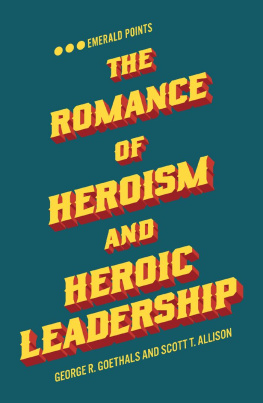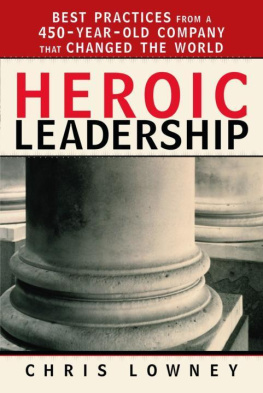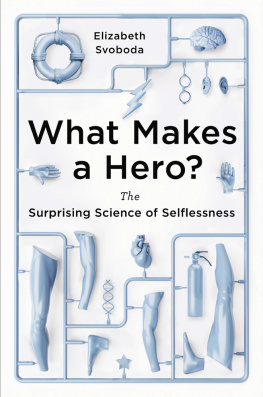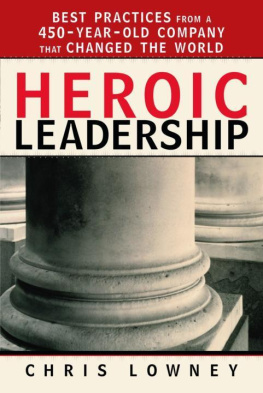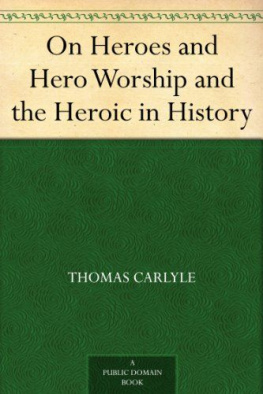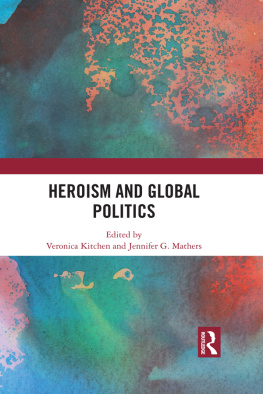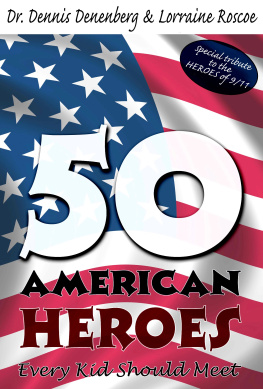For over a decade now we have tried to penetrate the complexities in the way people choose and perceive their heroes. At the same time, we have tried to outline carefully how people go beyond the ordinary to transform themselves in heroes. This books represents our efforts to integrate these two elements of heroism science. What constitutes and defines heroism, and how do people construct larger than life images of and stories about the extraordinary people they deem to be heroes? In attempting to answer these questions we have been supported by many colleagues, family, and friends. We are grateful to Dean Sandra Peart of the Jepson School of Leadership Studies and our fellow faculty members Kristin Bezio, Peter Kaufman, and Terry Price at Jepson and Karyn Kuhn, Camilla Nonterah, Matt Lowder, Kristjen Lundberg, Lisa Jobe-Shields, Karen Kochel, and Laura Knouse in the Department of Psychology. Elizabeth DeBusk-Maslanka has been exceptionally helpful in all aspects of editing this volume. She has been a source of wisdom and great generosity. Stephanie Trent helps in many ways to make it easier to do our work, and we are grateful.
At Emerald, we wish to thank Charlotte Maiorana for her interest and support and Charlie Wilson for her wonderful step-by-step guidance through the production process. You have made working with Emerald most rewarding.
Our families have had our backs throughout the months we have worked on this project. In particular, our heroic wives, Marion and Connie, have sustained the romance of marriage that enables us to do our work. We are forever grateful.
ABOUT THE AUTHORS
George R. Goethals holds the E. Claiborne Robins Distinguished Professorship in Leadership Studies at the Jepson School of Leadership Studies at the University of Richmond, Virginia. Previously at Williams College he served as Chair of the Department of Psychology, Founding Chair of the Program in Leadership Studies, and Provost. His recent books include Presidential Leadership and African Americans: An American Dilemma from Slavery to Freedom (Routledge, 2015) and Realignment, Region and Race: Presidential Leadership and Social Identity (Emerald Publishing, 2018). With Scott Allison, he has written about heroes and heroic leadership.
Scott T. Allison is Professor of Psychology at the University of Richmond. He has authored numerous books, including Heroes (OUP, 2011) and Heroic Leadership (Routledge, 2013). His other books include Heroic Humility (American Psychological Association, 2018), Reel Heroes & Villains (Agile Writer Press, 2015), Conceptions of Leadership (Palgrave Macmillan, 2014), Frontiers in Spiritual Leadership (Palgrave Macmillan, 2016), and the Handbook of Heroism and Heroic Leadership (Routledge, 2016). His work has appeared in USA Today, National Public Radio, The New York Times, The Los Angeles Times, Slate Magazine, MSNBC, CBS, Psychology Today, and The Christian Science Monitor. He has received Richmonds Distinguished Educator Award and the Virginia Council of Higher Educations Outstanding Faculty Award.
CHAPTER 1
INTRODUCTION: THE ROMANCE OF HEROISM
In the last decade, an exciting new field of study has emerged. Its subject is heroes and heroism. It is fast growing, multidisciplinary, and international. There is now enough of a corpus of scholarship to warrant referring to these various studies as constituting a scholarly discipline of heroism science. One manifestation of this new domain of study is the new journal, Heroism Science. Two other signs are new special issues on heroes and heroism in the Journal of Humanistic Psychology and in Frontiers in Psychology. Another is the 2017 publication of the Handbook of Heroism and Heroic Leadership. There is also a new biennial conference series in Heroism Science, the first held in Perth, Australia, in 2016, and the second in Richmond, Virginia, USA, in 2018. We have been privileged to be part of this new research endeavor.
Heroism Science includes a sprawling set of theoretical and empirical explorations of who heroes are, how they develop, what they do, and what theyre like. In short, these studies explore what makes heroes tick. Two illustrative studies from this vast domain of research are Walkers (2017) exploration of the moral character of individuals who step up as heroes and Francos (2017) work on heroic leadership in times of crisis. Another, smaller body of work examines how people think about heroes. Who comes to mind when people are asked to name heroes? What traits do heroes have? What do people believe heroes do? For example, scholars have explored how perceived heroes inspire or motivate the people who admire them (Kinsella, Ritchie, & Igou, 2017), how groups identify moral heroes (Decter-Frain, Vanstone, & Frimer, 2017), and the way people construct heroic images of underdogs (Vandello, Goldschmied, & Michniewicz, 2017).
Our own work has considered both sets of questions. Who are heroes, what defines heroism, and how do people think about heroes? However, most of our writings have focused on the latter set of questions, questions about how people construct perceptions of heroes. In taking this approach, we have perhaps stubbornly resisted defining what heroism is. We do note that many of the heroes people name are fictional. Some of them are so-called superheroes, while others are characters such as Arthur Conan Doyles consulting detective Sherlock Holmes, or the protagonist Rick Blaine in the classic 1942 film Casablanca, played by Humphrey Bogart. While the array of fictional and real people, from the past or still living, who are named as heroes is immense, there are two central attributes of these perceived heroes. They are almost always highly moral, and they are generally very competent and effective. These qualities are central to the great eight traits of heroism that emerge from our studies. Heroes are seen as Smart, Strong, Selfless, Caring, Charismatic, Resilient, Reliable, and Inspiring. These findings have prompted us to assert that heroism is in the eye of the beholder. Again, we resist specifying the defining qualities of heroes ourselves, or naming people as heroes.

